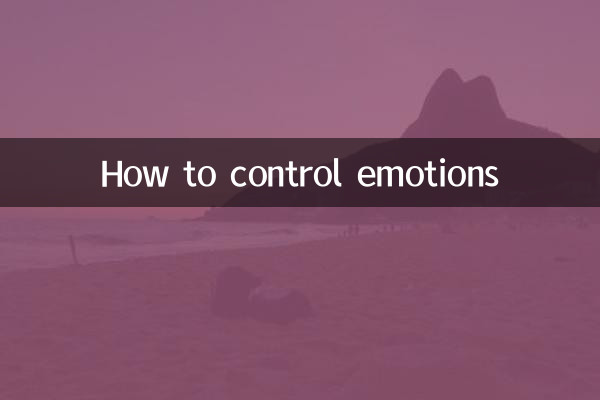How to control emotions
In today's fast-paced society, emotional management has become the focus of many people. Whether it is work pressure, interpersonal relationships, or social hot events, it may cause strong emotional fluctuations. This article will combine popular topics and hot content on the Internet for the past 10 days to discuss how to effectively control emotions and provide structured data to help readers better understand.
1. Recent hot emotions related topics

The following are emotional related topics that have been discussed on the Internet in the past 10 days:
| topic | Popularity index | Main emotional trigger points |
|---|---|---|
| Workplace stress and anxiety | 85 | Workload, career development |
| Emotional fluctuations caused by social media | 78 | Comparative psychological and negative comments |
| Family tension | 72 | Generation gap, poor communication |
| Anger caused by public events | 68 | Social injustice, moral controversy |
2. Scientific methods of emotional control
Based on psychological research and actual cases, the following are proven methods of emotion control:
| method | Effectiveness | Applicable scenarios |
|---|---|---|
| Deep breathing exercises | high | Instant emotional outburst |
| Cognitive reconstruction | high | Long-term emotional pattern |
| Movement release | Medium-high | Stress accumulation |
| Social support | middle | Emotional trouble |
| Mindfulness meditation | high | Various emotional problems |
3. Step-by-step emotional management guide
1.Identify emotional signals: Pay attention to body reactions (such as accelerated heartbeat, muscle tension) and changes in thinking.
2.Pause reaction: When your mood is high, give yourself 10 seconds to buffer.
3.Analyze the trigger source: Thinking about "what specific event triggers this emotion".
4.Choose a coping strategy: Choose the most suitable emotional regulation method according to the situation.
5.Implementing solutions: Take practical actions to improve emotional state.
6.Reflection afterwards: Record emotional events and processing processes, and accumulate experience.
4. Emotional control skills in different scenarios
| Scene | challenge | Coping skills |
|---|---|---|
| Workplace conflict | Angry, grievance | Keep a professional tone and focus on issues rather than personal |
| Family quarrels | Sad, disappointed | Set a cooling-off period and use "I sentence" to express your feelings |
| Social Media | Anxiety, jealousy | Limit usage time and cultivate real social interaction |
| Public places | Embarrassing, nervous | Breathing, positive self-suggestion |
5. Long-term strategies for emotional control
1.Establish emotional diary habits: Regularly record emotional changes and triggers.
2.Cultivate emotional immunity: Enhance emotional resilience through meditation, yoga, etc.
3.Optimize lifestyle: Ensure adequate sleep, balanced diet and regular exercise.
4.Expand emotion regulation toolkit: Learn a variety of emotional management skills and apply them flexibly.
5.Seek professional help: When self-regulation is ineffective, consider psychological counseling.
6. Common misunderstandings and truths
| Misconception | the truth |
|---|---|
| Controlling emotions is suppressing emotions | A healthy way is to identify and guide emotions |
| Emotional control is achieved overnight | Continuous practice and adjustment are required |
| Only negative emotions need to be controlled | Excessive excitement can also cause problems |
| Emotional control makes people feel cold | In fact, it is to improve emotional wisdom |
Emotional management is a skill that can be learned and improved. By understanding the nature of emotions, mastering scientific methods and practicing in daily life, we can establish healthier emotional response patterns to improve quality of life and work efficiency. Remember, controlling emotions does not negate feelings, but learns to express and process them in a constructive way.

check the details

check the details